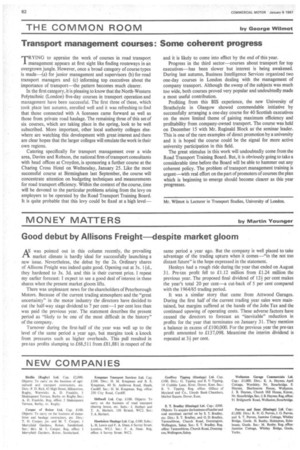Transport management courses: Some coherent progress
Page 64

If you've noticed an error in this article please click here to report it so we can fix it.
TRYING to appraise the work of courses in road transport management appears at first sight like finding routeways in in overgrown jungle. However, once a broad category of course types is made—(a) for junior management and supervisors (b) for road transport managers and (c) informing top executives about the importance of transport—the pattern becomes much clearer.
In the first category, it is pleasing to know that the North-Western Polytechnic (London) five-day courses in transport operation and management have been successful. The first three of these, which took place last autumn, enrolled well and it was refreshing to find that those connected with A licensees came forward as well as those from private road haulage. The remaining three of this set of six courses, which are taking place in the spring, look to be well subscribed. More important, other local authority colleges elsewhere are watching this development with great interest and there are clear hopes that the larger colleges will emulate the work in their own regions.
Catering specifically for transport management over a wide area, Davies and Robson, the national firm of transport consultants with head offices at Croydon, is sponsoring a further course at the Charing Cross Hotel on Wednesday, January 25. Like the most successful course at Birmingham last September, the course will concentrate attention on budgeting techniques and measurements for road transport efficiency. Within the context of the course, time will be devoted to the particular problems arising from the levy on employers to be operated by the Road Transport Training Board. It is quite probable that this levy could be fixed at a high level— and it is likely to come into effect by the end of this year.
Progress in the third sector—courses about transport for top executives—has been slower but interest is being awakened. During last autumn, Business Intelligence Services organized two one-day courses in London dealing with the management of company transport. Although the sweep of the subjects was much too wide, both courses proved very popular and undoubtedly made a most useful contribution.
Profiting from this BIS experience, the new University of Strathclyde in Glasgow showed commendable initiative by successfully arranging a one-day course for 40 Scottish executives on the more limited theme of gaining maximum efficiency and profitability from company-owned transport. The course was held on December 15 with Mr. Reginald Block as the seminar leader. This is one of the rare examples of direct promotion by a university and it is hoped the course could be the signal for more active university participation in this field.
The great stimulus in this work will undoubtedly come from the Road Transport Training Board. But, it is obviously going to take a considerable time before the Board will be able to hammer out any coherent policy. The problem of transport management training is urgent—with real effort on the part of promoters of courses the plan which is beginning to emerge should become clearer as this year progresses.












































































































